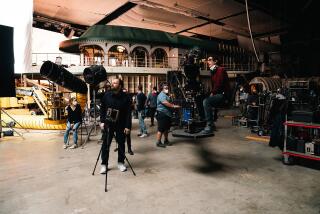The (Digital) Iceman Cometh
- Share via
VENICE, Italy — The British formula for success in cinema is usually pretty basic: soul-searching subject, first-rate script, talented character actors, raw natural setting. No Hollywood tricks; a simple, moody, low-budget piece of great film art will do just fine.
“The Winter Guest,” a directorial debut by the actor Alan Rickman, looks like such a film. Starring Emma Thompson and Phyllida Law, it won critical acclaim at the recent Venice Film Festival for its poetic study of mortality and human communication in an ice-bound Scottish village. The movie is set for American release on Dec. 19.
But looks deceive. The North Sea, the frozen backdrop that sets the wintry mood of the film, is not really frozen. It was turned to ice by a new character on the British movie scene--a digital effects computer brought over from Los Angeles.
“We had to have a frozen sea, but that rarely happens in Scotland,” Rickman explained. “It’s kind of a first to have a film on this intimate a scale that uses such modern technology.”
Indeed, while British filmmakers have teamed up with Hollywood in recent years to cast, produce and finance hit movies, they have been “frightened of going to these [special effects] wizards,” says Derek Malcolm, film critic of the British newspaper the Guardian.
Part of their reluctance, he said, is a British artistic disdain for the exploding volcanoes and earth-stomping dinosaurs of Hollywood spectaculars. Not to mention costs that would break any London studio.
But the frozen sea in Rickman’s film is far more modest. Finessed by the same machine that created intergalactic space ships for “Independence Day,” it cost just 8% of his shooting budget. And it is artistically unobtrusive--an “invisible effect” that supports the story.
The man who demonstrated this trick to Rickman and became the film’s special effects supervisor is Steve Rundell, who runs a Hollywood company called D.REZ and uses a digital effects system called the Quantel Domino. The technology is British, but it has been driven entirely by the American film market.
“We showed him some samples of a picture in which we were creating a desert,” Rundell said. “Then we showed him how we could freeze an ocean. The basic approach is the same. I think that was a major selling point for the movie--that, yes, this can be done in Scotland.”
“It was either that or find an expensive location in Antarctica or Lapland,” said Kenneth Lipper, the film’s American co-producer.
The shooting occurred last winter in the East Neuk of Fife along the north shore of the Firth of Forth. Rundell and his team, the only Americans on the set, went up in a helicopter and shot the North Sea. Then they digitally “froze” those images to create ice backdrop shots that were “layered” into scenes with characters and dialogue standing near the shore.
When the sky turned blue during shooting, Rundell digitally altered it to the gray overcast that appears in the film. “We also threw in some computer-generated 3-D sea gulls just for effect,” he said. About 75 shots were digitally contrived.
One thing the computer couldn’t control was the real sea--or the real winter cold. With the sea frozen on the screen, Rickman had to shoot at low tide so real waves wouldn’t make noise or lap at the actors’ feet, and that necessity prolonged his work. He got frostbite and suffered nerve damage in his toes.
But the system helped save time and money. It was agile enough that the director was able to see instant replays of takes showing actors against the ice backdrop--and re-shoot them if necessary.
“We did not have a limitless budget, but the technology allowed me to give the film epic production values and to create scenes that would otherwise have been impossible,” Rickman said, adding that this “allowed me to put my imagination on film.”
Purists like Malcolm worry, however, that Hollywood high-tech may end up leading British directors astray, especially with more investment pouring into Britain’s booming film industry.
“ ‘The Winter Guest’ is a sign that cinema in Britain is going technological, as it is everywhere else,” said Malcolm, who gave the film a thumbs-up. “But I hope this doesn’t lead to big transatlantic blockbusters. We have to be very careful that we don’t start making a lot of rubbish.”
More to Read
Only good movies
Get the Indie Focus newsletter, Mark Olsen's weekly guide to the world of cinema.
You may occasionally receive promotional content from the Los Angeles Times.










